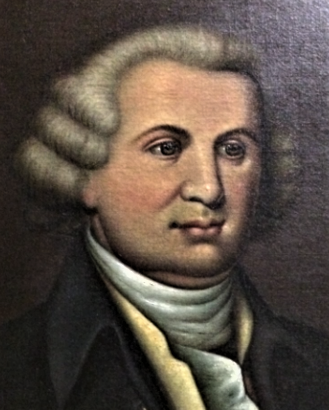John Penn of North Carolina: Lawyer, Continental Congress Delegate, Board of War Member, and Declaration of Independence Signer
John Penn was a lawyer, North Carolina delegate to the Continental Congress, patriot, and some might say a bit of a rebel. Most importantly, he was one of 56 men who pledged to each other, “our lives, our fortunes and our sacred honor” by signing the Declaration of Independence.
John Penn was not the most famous of the 56 signers. In fact, not much is written about him in the usual literature; however, from what is known and written, Mr. Penn led a fairly fascinating life. He was born May 17, 1741 (his birth has also been recorded as May 6, 1740) in Port Royal Virginia to Moses and Catherine Penn, an only child. The family was not wealthy and since the senior Mr. Penn did not see value in a formal education, John attended only two years of school before working with his father on the family farm. John’s father died when John was 18; he then went to live with his uncle, Edmund Penderton, where he completed his education by entering law school. In 1762, Penn became an attorney in Virginia.
After marriage to Susanna Lyne in 1763, and 2 children, the family moved to North Carolina in 1774, where they purchased a farm in Granville County. It was in North Carolina that Penn developed some very patriotic views about taxation especially, and firmly believed the only way to resolve the problems with the mother country of Great Britain was complete separation from her. He was vehemently against the Stamp Act and King George III, and some would say almost to the point of being disrespectful. As a consequence of his outspokenness, Penn was brought up on charges and found guilty. However, a sympathetic judge set Penn’s sentence at ONE CENT which Penn refused to pay on principle.
Subsequently, Penn entered a career in politics where he served in various capacities until his untimely death in 1788. Penn was elected to the Third Provincial Congress in 1775. These provincial congresses were governmental bodies that led the transition from royal government to states governments. The Third Congress established an executive committee and six military districts. Bills of credit that were issued were used as currency to fund organized armies in defense of the colonies. From there, Penn was sent as a delegate to the Continental Congress where he served until 1780.
Penn was a supporter and signer of a document called the Olive Branch Petition. Adopted in July of 1775, this petition was considered a last chance effort to appeal to the King of England and avoid war. The Petition contained a Declaration of Causes and outlined the necessity and reasons for the 13 colonies to take up arms in the American Revolutionary War. The King ultimately rejected the Olive Branch petition and the formal push for Independence from England began.
In 1776, as a champion of liberty, John Penn affixed his signature, along with 55 other men, to the Declaration of Independence. Continuing his belief that a permanent union of states was necessary, he also signed the Articles of Confederation.
Penn served in the Continental Congress until 1780. During that time, Penn, a very zealous man when it came to the Colonies separating from England, clashed with other members of the Congress who were not as convinced. This included the President of the Congress, Henry Laurens. As it turned out, Mr. Penn and Mr. Laurens roomed together during this time. Mr. Laurens, who was much older than Penn and in disagreement with his views, challenged Penn to a duel. But the duel was canceled the morning of, as Mr. Penn suggested such an idea was just foolish. Mr. Laurens agreed and the duel was canceled.
British victory at Camden in august of 1780 paved the way for the British invasion of North Carolina. Because the governor did not seem to have adequate emergency powers, he requested the formation of a Board of War, a three-member board, on which Penn was appointed to serve. Because the other two members rarely attended meetings, Penn had extra latitude to decide on several courses of action including where to send military supplies, and the coordination of military activities. The State assembly abolished the Board in January 1781 after complaints from military officers who opposed civilian interference and supposed usurpation of power.
Penn continued to hold various positions in government until his death in 1788, at the young age of 47. Originally, he was buried near his home in Granville County. In 1894, his remains were reinterred at Guilford Courthouse National Military Park, in North Carolina, site of one of the turning-point battles late in the American Revolutionary War.
 Barb Zakszewski is a wife, mother and grandmother, lifelong conservative, regular civic volunteer and writer.
Barb Zakszewski is a wife, mother and grandmother, lifelong conservative, regular civic volunteer and writer.
 Podcast by Maureen Quinn.
Podcast by Maureen Quinn.
Click Here To Sign up for the Daily Essay From Our 2021 90-Day Study: Our Lives, Our Fortunes & Our Sacred Honor
Click Here To View the Schedule of Topics From Our 2021 90-Day Study: Our Lives, Our Fortunes & Our Sacred Honor




Join the discussion! Post your comments below.
Your feedback and insights are welcome.Feel free to contribute!